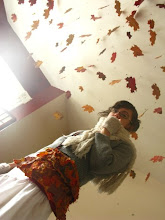I'm telling a friend that i'm tired; he stops me.
"Cansada. Eres cansada."
Riiiight, cansado for boys, cansada for girls.
This isn't the first time someone has called me on speaking as though i'm a man.
I'm not doing it on purpose, but i sort of like the fact that clear definitions of gender are as instinctively unimportant to me while speaking spanish as they are in most other contexts.
However, it seems to bother everyone else. The same conversation happened with one of the mothers who lives in our house, and she seemed sort of embarrassed for me, that i'd made this mistake.
Bolivia isn't as progressive with gender roles as North America. (not that north america is perfect either)
It's subtle, but women aren't treated (nor taught to act) as um, equally, as men. Gender roles are more separated and women are more likely to be excluded from "serious" things. Or maybe they're not as likely to be raised to participate in serious things. I see this a little in my office.
It's all really subtle, but it's there.
People frequently call me "Mamamita", which means more or less "little mama".
This generally comes from guys, but also from older people. I guess it's generally just a term of endearment.
I find it kind of disturbing that people who don't know my name refer to me instead by my reproductive capacities.
If you ever wanna hit on me in a way that will make you never want to touch you, just remind me that i'm capable of bearing your children.
Anyway, so i don't know if the language is the innocent product of a macho society, or if the language is serving to reinforce that machismo, but either way it's a symbol and a reminder of the still-less-important state of women here, and so it kinda bothers me.
I can claim that i'm not deliberately talking like a man, but i can't claim to have made the effort to start talking like a mamamita.
Maybe i'll start saying i'm cansadoa?
Subscribe to:
Post Comments (Atom)

2 comments:
Working in a ministry, it's clear to me that womans in Bolivia have subordinate roles. They are mostly secretaries and simply can't have power roles.
You see this everywhere on the streets. Who owes the little 'tiendas', working 14 hours a day? All womans. And most of the times they have to handle their child while they sell their stuff. Where's the man I wonder? Can't mens take cares of the childs? Well it's not in the Bolivian culture I guess.
Today I was showing the photos of a defile we had in La Paz to my colleague Rosa. There was a photo with an army regiment entirely composed of womans. She said that the access to the commanding roles in the army was open the the womans not a long time ago.
I guess there's hope for gender equity for the future. If the army show open-mindedness, then anybody can.
I don't know how to regulate this in speech, but at a blog that I read occasionally, the blogger, Nezua, using the arroba @ at the end of gender-according words. I don't know if that was clear, but I think you get what I'm saying.
Por examplo: I saw a group of muchach@s hanging out in front of ... wherever today. The arroba is a nice blend of the a (por femenino) y the o, por masculino.
Post a Comment